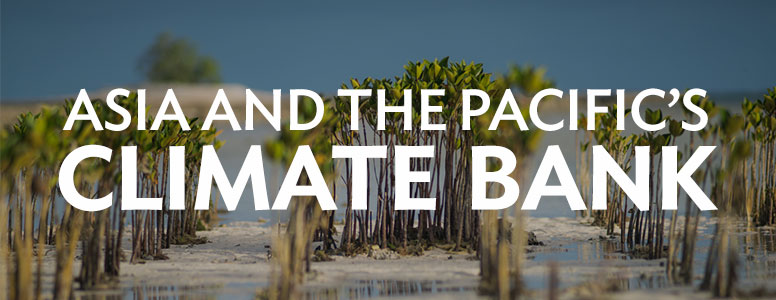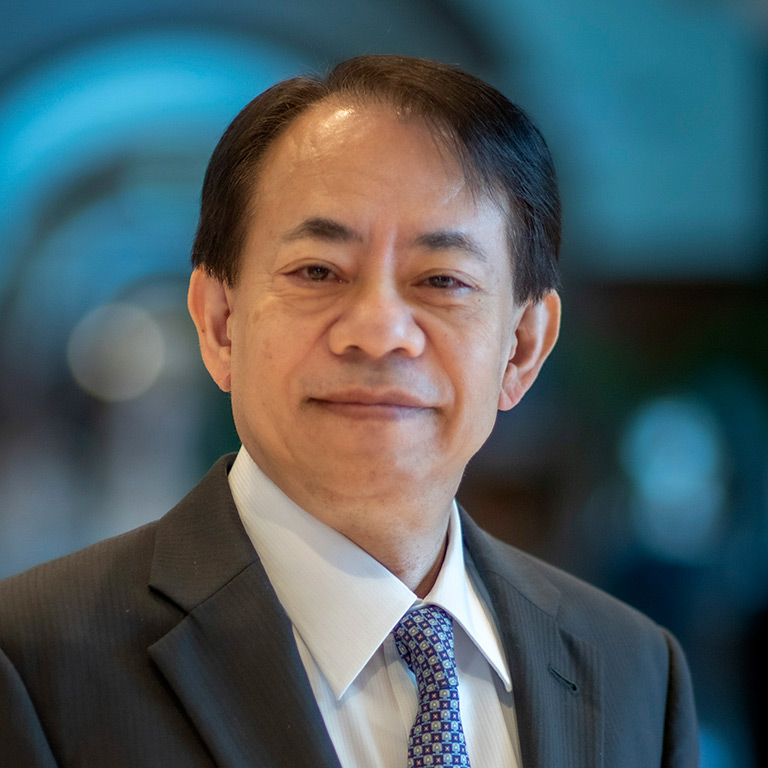How We're Organized
ADB is committed to achieving a prosperous, inclusive, resilient, and sustainable Asia and the Pacific, while sustaining its efforts to eradicate extreme poverty. Established in 1966, it is owned by 68 members—49 from the region.
Masatsugu Asakawa
Masatsugu Asakawa is the President of the Asian Development Bank (ADB) and the Chairperson of ADB’s Board of Directors. He was elected President by ADB’s Board of Governors and assumed office on 17 January 2020.
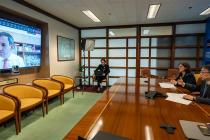 Australia's Treasurer, President Asakawa underscore partnership
Australia's Treasurer, President Asakawa underscore partnershipPresident Masatsugu Asakawa and the Treasurer of the Commonwealth of Australia Parliament House and ADB Governor Jim Chalmers MP, in a conference call on 11 December, underscored the importance of the partnership between the two institutions. The two leaders, recognizing the shared ambitions for the Pacific and the broader Asia region, emphasized further strengthening collaboration. President Asakawa highlighted ADB’s evolution agenda. He drew on examples such as the success of the Capital Adequacy Framework review, the realignment of expertise through the new operating model, and the scaling up of climate finance through platforms such as IF-CAP. Executive Director Rachel Thompson joined the call.
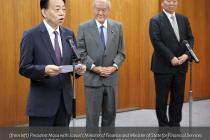 ADB, JICA sign agreement to establish LEAP 2 fund
ADB, JICA sign agreement to establish LEAP 2 fundPresident Masatsugu Asakawa and JICA President Akihiko Tanaka on 8 December signed an agreement to establish the Leading Asia's Private Infrastructure Fund 2 (LEAP 2) with JICA contributing up to $1.5 billion and ADB acting as the fund manager. At the signing ceremony in Tokyo, President Asakawa emphasized the need for high-quality and sustainable infrastructure under the growing severity of climate change impacts and added that LEAP 2 will help the region meet this challenge by filling financing gaps for urgently needed infrastructure projects through the mobilization of private sector capital. President Asakawa also met with Japan’s Minister of Finance and Minister of State for Financial Services and ADB Governor Shunichi Suzuki to express his appreciation for Japan's $600 million contribution to IF-CAP announced at COP28, which substantially increased IF-CAP's financing guarantees to over $1 billion. Read the news release.
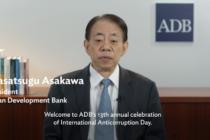 President Asakawa underscores good governance to achieving climate ambitions at International Anticorruption Day
President Asakawa underscores good governance to achieving climate ambitions at International Anticorruption DayADB celebrated International Anticorruption Day with an interactive exhibit and knowledge-sharing session organized by its Office of Anticorruption and Integrity from 5 to 7 December. President Masatsugu Asakawa, in his welcome message, reaffirmed ADB's commitment to upholding the highest ethical standards. He emphasized that as the region’s climate bank, it is ADB's duty to protect climate projects from corruption by practicing transparency, integrity, and honesty. The Green and Clean: Protecting Climate Finance from Corruption session included Bradley Hope, a Pulitzer Prize nominee, New York Times bestselling author of the Billion Dollar Whale and former Wall Street Journal reporter.
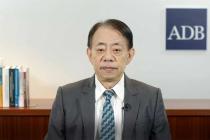 ADB participates in ASEAN+3 Economic Cooperation and Financial Stability Forum in Japan
ADB participates in ASEAN+3 Economic Cooperation and Financial Stability Forum in JapanAt the Second ASEAN+3 Economic Cooperation and Financial Stability Forum on 5 December in Kanazawa, Japan, President Masatsugu Asakawa, in a recorded speech, underscored the importance of strong regional cooperation in meeting the challenges facing the Asia and Pacific region. He emphasized the vital role of cooperation to ensure macrofinancial stability, promote international trade and investment, build supply chain resilience, and address the climate crisis.
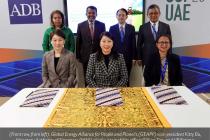 COP28: ADB pushes for a just energy transition and climate resilience
COP28: ADB pushes for a just energy transition and climate resilienceDuring the Energy, Industry, and Just Transition Day, ADB's Energy Transition Mechanism (ETM) was featured as the key initiative to reduce CO2 under the managed phase out of coal.
President Masatsugu Asakawa was joined by Indonesia’s Minister of Energy and Mineral Resources (MEMR) Arifin Tasrif, and Monetary Authority of Singapore (MAS) Managing Director Ravi Menon at the high-level session, where ADB, MAS, and the Global Energy Alliance for People and Planet signed a memorandum of understanding to secure $2 billion in support of the region’s energy transition. ADB and MEMR also signed a separate agreement to advance Indonesia’s just and affordable energy transition. Prior to these, a framework agreement for the first ETM transaction, which aims to retire the Cirebon-1 coal-fired power plant nearly seven years ahead of its projected closure, was signed between ADB and the Indonesian Government. Also, VP Fatima and Philippine Department of Energy Undersecretary Felix William Fuentebella separately opened a panel discussion on driving energy transition in a market-based power sector.
At the joint ADB and Coalition of Finance Ministers for Climate Action session, President Asakawa launched the new Climate Resilient Fiscal Planning publication. The Ministries of Finance, ADB, and the Coalition of Finance Ministers for Climate Action discussed how climate-resilient fiscal planning can scale up and align finance with adaptation and resilience.
President Asakawa opened the Scaling Up Local Investments in Adaptation That Leaves No One Behind - Launch of Community Resilience Partnership Program (CRPP) Investment Fund and CRPP Small Grant Window event. ADB, in partnership with the Green Climate Fund, launched the CRPP Investment Fund of $120 million to scale up the implementation of local adaptation solutions through investments in adaptive social protection, community-driven development, resilient livelihoods, and climate risk-informed decentralization.

ADB Commits Record Climate Finance of Almost $10 Billion in 2023
ADB committed a record amount of climate finance in 2023 to help its developing member countries in Asia and the Pacific cut greenhouse gas emissions and adapt to the impacts of a warming planet.

ADB, GEAPP, and MAS to Establish Energy Transition Acceleration Finance Partnership in Asia
ADB, Global Energy Alliance for People and Planet (GEAPP), and the Monetary Authority of Singapore (MAS) today announced their intent to establish a blended finance partnership to accelerate the energy transition at scale in Asia.
ADB and Partners Launch Nature Financing Initiative for Asia and the Pacific
ADB today launched a Nature Solutions Finance Hub for Asia and the Pacific at COP28 which aims to attract at least $2 billion into investment programs that incorporate nature-based solutions, particularly focused on capital markets and other sources of private capital.
ADB to Program $10 Billion in Climate Finance for Philippines
ADB will program $10 billion in climate finance for the Philippines between 2024 and 2029. The support, announced by ADB President Masatsugu Asakawa at a high-level dialogue on financing coalitions at COP28 in Dubai, will help the Philippines implement its commitments to climate action under the Paris Agreement.
New ADB Initiative to Strengthen Women’s Resilience to Heat Stress in Asia
ADB has launched a new initiative to better understand and invest in adaptation to the impacts of heat stress on women and girls across Asia and the Pacific.
New Agreement Aims to Retire Indonesia 660-MW Coal Plant Almost 7 Years Early
The 660-megawatt coal plant Cirebon-1 in Indonesia will likely be retired almost 7 years earlier than scheduled as a result of discussions with the plant’s owners and the Government of Indonesia under the Energy Transition Mechanism program of ADB.
ADB to Help Strengthen Climate Resilience in Hindu Kush Himalayas
ADB today launched a new initiative to help assess and manage climate and disaster risks in the Hindu Kush Himalaya region, a critical water tower supporting the livelihoods of more than a billion of people across Asia.CAREC Countries Endorse New Vision to Fight Climate Change Together
Member countries of the Central Asia Regional Economic Cooperation (CAREC) Program today committed to work together to cut greenhouse gas emissions and build resilience to climate change.ADB to Step Up and Diversify Support for Georgia’s Development
ADB President Masatsugu Asakawa in a meeting today with Georgian Prime Minister Irakli Gharibashvili said ADB plans to step up its support for Georgia’s development as it diversifies its engagement with the Caucasus nation.ADB President Commits Support for Armenia’s Long-Term Development Objectives
ADB President Masatsugu Asakawa committed to helping Armenia realize its long-term development objectives in a meeting with Prime Minister of Armenia Nikol Pashinyan in Yerevan.
Catalyzing energy sector decarbonization: Lessons learned from piloting the Energy Transition Mechanism (ETM) in Asia and the Pacific - Masatsugu Asakawa
Opening remarks by Masatsugu Asakawa, President, Asian Development Bank, at COP28, 5 December 2023, Dubai, United Arab EmiratesNature Solutions Finance Hub - Masatsugu Asakawa
Remarks by Masatsugu Asakawa, President, Asian Development Bank, at the launch of the Nature Solutions Finance Hub, 4 December 2023, Dubai, United Arab EmiratesResponding to the Impact of Heat Stress on Women in Asia and the Pacific - Masatsugu Asakawa
Opening remarks by Masatsugu Asakawa, President, Asian Development Bank, at Rising Above the Heat: Forging Women-Led Solutions to Heat Stress at COP28, 4 December 2023, Dubai, United Arab EmiratesLoan Signing Ceremony for the Davao Public Transport Modernization Project - Masatsugu Asakawa
Remarks by Masatsugu Asakawa, President, Asian Development Bank, at the Loan Signing Ceremony for the Davao Public Transport Modernization Project, 1 July 2023, Davao City, Philippines15th Brunei-Indonesia-Malaysia-Philippines East ASEAN Growth Area (BIMP-EAGA) Leaders’ Summit - Masatsugu Asakawa
Remarks by Masatsugu Asakawa, President, Asian Development Bank, at the 15th Brunei-Indonesia-Malaysia-Philippines East ASEAN Growth Area (BIMP-EAGA) Leaders’ Summit, 11 May 2023, Labuan Bajo, Indonesia
15th Indonesia-Malaysia-Thailand Growth Triangle (IMT-GT) Leaders’ Summit - Masatsugu Asakawa
Remarks by Masatsugu Asakawa, President, Asian Development Bank, at the 15th Indonesia-Malaysia-Thailand Growth Triangle (IMT-GT) Leaders’ Summit, 11 May 2023, Labuan Bajo, IndonesiaAddress to the Board of Governors 56th ADB Annual Meeting Business Session - Masatsugu Asakawa
Address by Masatsugu Asakawa, President, Asian Development Bank, to the Board of Governors Business Session, at the 56th Annual Meeting, 4 May 2023, Incheon, Republic of KoreaMeeting Challenges through Evolution: ADB’s Leadership on Development in Asia and the Pacific - Masatsugu Asakawa
Address by Masatsugu Asakawa, President, Asian Development Bank, to the Board of Governors Opening Session, at the 56th Annual Meeting, 3 May 2023, Incheon, Republic of KoreaOpening Statement at the 56th ADB Annual Meeting Press Conference - Masatsugu Asakawa
Opening statement by Masatsugu Asakawa, President, Asian Development Bank, at the President's press conference at the 56th Annual Meeting, 2 May 2023, Incheon, Republic of KoreaWorking Together for a Resilient and Sustainable ASEAN - Masatsugu Asakawa
Speech by Masatsugu Asakawa, President , Asian Development Bank, at the 9th ASEAN Finance Ministers and Central Bank Governors’ Meeting (AFMGM), 31 March 2023, Bali, Indonesia

56th ADB Annual Meeting: Governors' Business Session
ADB President Masatsugu Asakawa discussed how ADB is preparing to address new challenges facing Asia and the Pacific through increased investments in food security, private sector non-sovereign financing, ADB operations supporting gender equality, and climate finance through the Innovative Finance Facility for Climate in Asia and the Pacific (IF-CAP).

56th ADB Annual Meeting: Opening Session of the ADB Board of Governors
In an address at the Opening Session of 56th Annual Meeting of the ADB Board of Governors, ADB President Masatsugu Asakawa laid out his vision for ADB’s future.

56th ADB Annual Meeting: Governors' Seminar - Policies to Support Asia's Rebound
Asia’s recovery from the pandemic faces multiple challenges. The panel discusses what policies should be prioritized to ensure that the region’s rebound remains resilient.

Rebounding Asia and the Pacific: Forging the Path Forward - A Conversation with ADB President Masatsugu Asakawa
As a curtain raiser to the 56th Annual Meeting of the ADB Board of Governors, ADB President Masatsugu Asakawa and international journalist Zeinab Badawi discussed ADB’s economic outlook for Asia and the Pacific and the challenges ahead for the region.

55th ADB Annual Meeting (2nd Stage): CNBC Debate - Managing Asia's Energy Transition
Panelists in this event addressed how economies in Asia and the Pacific can achieve an energy transition that meets rapidly rising demand.

55th ADB Annual Meeting (2nd Stage): Meeting Between Civil Society Organizations and ADB Senior Management
ADB President Masatsugu Asakawa met with representatives of civil society organizations (CSOs) and nongovernment organizations (NGOs).

55th ADB Annual Meeting (2nd Stage): From Pandemic to Recovery - Ideas for Change in Asia and the Pacific
In a frank and engaging conversation with international broadcast journalist Zeinab Badawi, ADB President Masatsugu Asakawa offered his vision and ideas for change towards a better, greener, more sustainable, and resilient Asia and the Pacific.

Message by ADB President Masatsugu Asakawa for the Partnership Report 2020
ADB President Masatsugu Asakawa introduced the 2020 Partnership Report at this virtual launch. He thanked ADB’s partners for their hard work in 2020 and called for support to ensure a green, resilient, and inclusive recovery.

Re-Imagining Asia and the Pacific in a Post-Pandemic World
In this conversation with international broadcaster Zeinab Badawi, ADB President Masatsugu Asakawa shares his thoughts on the pandemic situation, including how he envisages the recovery of the Asia and the Pacific region.

CNBC Debate 2021: Shaping the Great Reset in Asia
A high-level panel of experts exchanged views on what it will take to ensure that developing Asia’s Great Reset points the region toward a green, resilient, and inclusive future.
Masatsugu Asakawa is the President of the Asian Development Bank (ADB) and the Chairperson of ADB’s Board of Directors. He was elected President by ADB’s Board of Governors and assumed office on 17 January 2020. In August 2021, he was reelected for a 5-year term starting on 24 November 2021.
Under Mr. Asakawa’s leadership, ADB made significant contributions to the region’s COVID-19 pandemic response and recovery planning with a $20 billion comprehensive response package and $9 billion Asia Pacific Vaccine Access Facility. He also played a key role in rolling out a series of new and innovative financing initiatives—including an Energy Transition Mechanism — to spur the region’s low-carbon development and elevated ADB’s 2030 cumulative climate financing ambition to $100 billion as ADB continues to focus on the battle against climate change.
Prior to joining ADB, he served as Special Advisor to Japan’s Prime Minister and Minister of Finance, and has a close-to-four decades’ career at the Ministry of Finance with diverse professional experience that cuts across both domestic and international fronts.
In the immediate aftermath of the Global Financial Crisis, Mr. Asakawa, in his capacity as Executive Assistant to Prime Minister Taro Aso, took part in the first G20 Leaders’ Summit Meeting in November 2008. He was instrumental in orchestrating a globally coordinated financial package to abate the financial crisis, including a $100 billion loan from Japan to the International Monetary Fund (IMF). Then in 2016, in his capacity as Vice Minister of Finance for International Affairs, he took on a leading role for the G7 Finance Ministers and Central Bank Governors’ meeting in Sendai under the Japanese presidency, where a sustainable and inclusive development agenda was extensively discussed.
Most recently, he served as Finance Deputy for the G20 meetings under the Japanese presidency, playing a pivotal role for the success of the G20 Osaka Summit as well as the G20 Finance Ministers and Central Bank Governors’ meeting in Fukuoka. Some of his outstanding achievements in Osaka include the endorsement by the G20 Leaders of the “G20 Principles for Quality Infrastructure Investment” and the “G20 Shared Understanding on the Importance of UHC Financing in Developing Countries”. Before these, he had occupied various prominent positions within the Finance Ministry, including director positions in charge of development policy issues, foreign exchange markets, and international tax policy.
Mr. Asakawa’s professional experience extends beyond the realms of the Japanese government. Most notably, he served as Chief Advisor to ADB President Kimimasa Tarumizu between 1989 and 1992, during which time he spearheaded the creation of a new office focused on strategic planning. Also, he had frequent engagement with the Organisation for Economic Co-operation and Development in such positions as Chair for Committee on Fiscal Affairs (2011–2016). Furthermore, he was a senior staff at the Fiscal Affairs Department of the IMF (1996–2000). In the meantime, he gave lectures as Visiting Professor at the Graduate School of Economic Science, Saitama University (2006–2009), and at the Graduate School of Arts and Sciences, University of Tokyo (2012–2015).
Mr. Asakawa obtained his BA from University of Tokyo (Economics Faculty) in 1981, and MPA from Princeton University, USA, in 1985.
President in the News
- ADB committed record US$9.8 billion in climate finance in 2023
- ADB president greets Sheikh Hasina on election win
- Winning the war vs climate change
- President of Asian Development Bank (ADB) met with Tegeta Holding representatives
- Georgia’s Municipal Development Fund first institution to be granted right to make procurements for ADB-backed projects
- ADB, GEAPP and MAS join forces for energy transition finance partnership in Asia
- ADB launches nature solutions finance hub for Asia-Pacific with USD 2 billion investment goal
- Asian Development Bank to provide $10 bln climate finance for Philippines
- ADB launches heat stress adaptation program for women in Tajikistan
- Bangladesh and int’l partners to launch Climate and Dev Platform
- ADB to Support Climate and Disaster Risk Assessment in Bhutan and Nepal
- Georgian finance, infrastructure ministers, ADB president discuss cooperation
- Acting National Bank Governor, Asian Development Bank President discuss financial stability, macroeconomic trends

